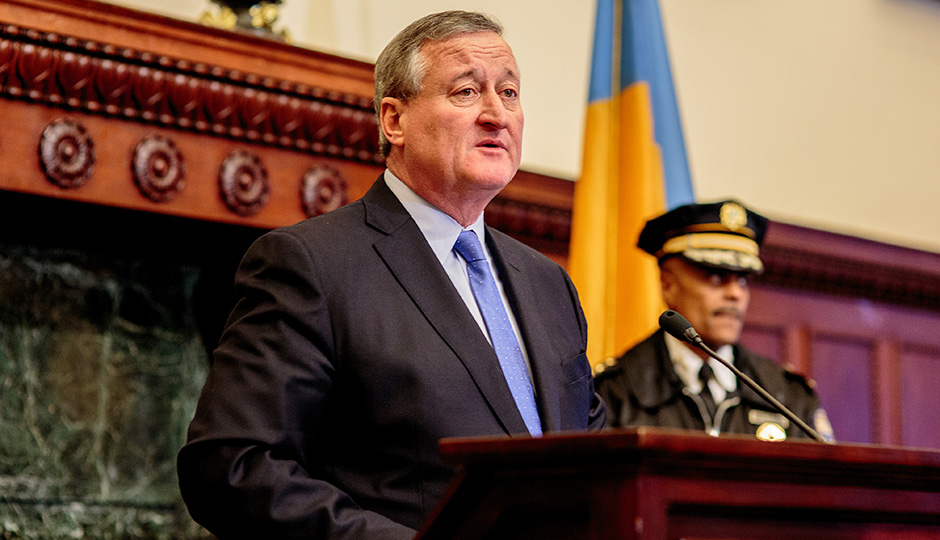ACLU: Philly Is Setting Itself Up for Conflict With DNC Protesters

Mayor Jim Kenney and Police Commissioner Richard Ross. | Photo by Jeff Fusco
The ACLU of Pennsylvania faxed a letter to Mayor Jim Kenney this morning raising questions about the city’s stance on protests during the Democratic National Convention. The letter claims that the city has taken positions that may violate protesters’ First Amendment rights during the convention, despite promises made earlier to the group that dissent would be tolerated.
“We are deeply troubled by recent statements made by your attorneys that seem to be setting the city up for conflict with protesters during the Democratic National Convention,” wrote the Pennsylvania ACLU’s executive director Reggie Shuford and deputy legal director Mary Catherine Roper. “We are concerned that the city law department seems to have walked back several statements made earlier about how the city would accommodate protest during the DNC. The new positions articulated by the law department raise serious First Amendment issues.”
The letter says the city’s law department has refused to guarantee that nonviolent activists without permits will be allowed to protest. The ACLU claims that city officials had previously promised to not interfere with protesters except to “protect public safety and local business.”
Another major issue is protesters’ access to Broad Street, ACLU attorneys say. According to the letter, the city recently told that ACLU that it does not plan to issue permits for demonstrations or marches on Broad Street, which has “traditionally been one of the most-used march routes for Philadelphia demonstrations.” The group says that while it was led to believe that sections of Broad Street might be off-limits or have barriers, it was not told previously that the entire street would be closed.
Lauren Hitt, a spokeswoman for Kenney, said the city addressed the ACLU’s concerns in previous meetings attended by high-level representatives.
“Given this record of cooperation between the city and the ACLU, we were extremely disappointed that the ACLU has created unnecessary distrust in the city’s plans regarding demonstrators in the interest of garnering national media attention,” she said. “The ACLU claims to have sent this letter to reduce public confusion, but in reality, they released this letter to the media at the same moment they sent it to the city, giving the city no opportunity to respond.”
She said some of the ACLU’s concerns were unfounded.
“There will be no blanket ban on demonstration on Broad Street,” she said. While the city is “strongly encouraging” all protesters to apply for a permit because demonstrating without one is illegal, individuals who are peacefully protesting have traditionally not been arrested, she added. City officials said permits will not be issued during rush hour in Center City because it would disrupt the travel of ambulances and other public safety vehicles.
The ACLU’s letter also asked which law enforcement officials will be in charge during the DNC. The group says the Philadelphia Police Department insists it will be in control; however, it claims that it has been told by others that state police at the DNC “will not be bound by PPD directives.”
Finally, the ACLU requests a clear stance on camping, since the city is expecting more visitors than it has room for in hotels. The letter asks for the city to temporarily lift its ban on camping, as well as to provide assurances that protesters in South Philly’s Franklin Delano Roosevelt Park will not be interfered with after hours.
According to Hitt, the closing time of FDR Park has been extended until 10 p.m. from July 24th to July 28th in order to accommodate protesters, and the city is planning to provide them with misting tents, water and restrooms. Camping will not be allowed, however. The ordinance prohibiting camping will still be in effect throughout the city due to health and safety concerns, she said. As far as policing goes, Hitt said that state and federal law enforcement agencies are not legally bound by the PPD’s policies, but the city does not expect them to “stray outside the scope” of the rules. The fencing around the perimeter is controlled by the Secret Service, which has not confirmed to the city what the bounds will be or what kind of fencing it will be using.
Additionally, City Council is currently considering a bill introduced on behalf of Kenney, which would decriminalize nuisance violations. These types of violations are common at protests, and the legislation would allow police to issue citations to violators during the DNC instead of arresting them.
Last year, former Mayor Michael Nutter was criticized over the city’s handling of the papal visit. The DNC will be the first time Kenney presides over an event of this scale, and observers will be looking to see whether he is more successful than his predecessor.
Read the whole letter here: